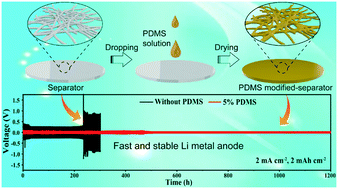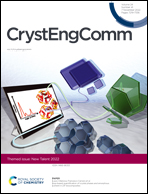Polydimethylsiloxane functionalized separator for a stable and fast lithium metal anode†
Abstract
Uncontrollable lithium dendrite growth which typically results in poor cycling stability and safety issues remains a great challenge for lithium metal batteries. Herein, we report a novel separator modification strategy by using polydimethylsiloxane (PDMS) to functionalize a glass fiber separator to inhibit dendrite growth. The PDMS-modified separator not only acts as a mechanical barrier but also promotes the desolvation of lithium ions. Consequently, Li/Li symmetric cells with optimal PDMS-modified separators are able to stably cycle for more than 1200 hours at 2 mA cm−2 with a stable polarization voltage (about 60 mV). Moreover, with the assistance of the functionalized separator, the assembled Li/LiFePO4 full cell can impressively achieve capacity retention up to 82.5% and a coulombic efficiency of ∼99.4% after 200 cycles at 1.0 C. The PDMS functionalization strategy provides a simple and efficient approach for developing safe and high-performance lithium metal batteries.

- This article is part of the themed collection: New Talent 2022


 Please wait while we load your content...
Please wait while we load your content...